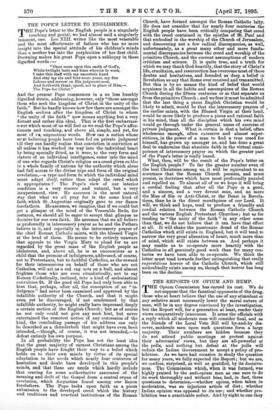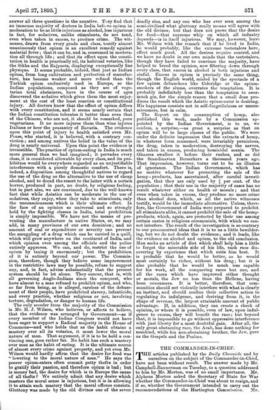THE REPORTS ON OPrl7M AND HEMP.
T"OpiumCommission has earned its cost. We do not suppose that the fanatical opponents of the drug, those who at heart believe that the use of any stimulant or any sedative must necessarily lower the moral nature of man, will be in any degree convinced by the investigation, but the Report will, for a generation at least, render their views comparatively innocuous. It arms the officials with a reply which all moderate men will consider final, and as the friends of the Local Veto Bill will by-and-by dis- cover, moderate men upon such questions form a large majority. Their numbers are hidden because they do not attend public meetings or protest against their adversaries' views, but they are all-powerful at the polls, and nothing but defeat at the polls will induce the Indian Government to accept a policy of pro- hibition. As we have had occasion to study the question for many years, we fully expected the Report ; but we are, we confess, surprised, as well as gratified, by its decisive- ness. The Commiesion which, when it was formed, wae highly praised by the anti-opium men as one sure to do its work thoroughly and without bias, had, in fact, three questions to determine,—whether opium, when taken in moderation, was an injurious article of diet ; whether Indian opinion was opposed to its use; and whether pro- hibition was a practicable policy. And by eight to one they answer all three questions in the negative. Teey find that an immense majority of doctors in India believe opium in moderation to be as little injurious as alcohol, less injurious in fact, for sedatives, unlike stimulants, do not tend, even when taken in excess, to produce crime. The wit- nesses, drawn from every grade and. class, testify almost unanimously that opium is an excellent remedy against malarial fever ; that it can be, and is, consumed in modera- tion all through life ; and that its effect upon the consti- tution in health is practically nil, its habitual votaries, like the Sikhs and the Rajpoots, displaying exceptionally fine physique. It seems probable, indeed, that just as Indian opium, from long cultivation and perfection of manufac- ture, has become weaker and more refined than the Turkish opium exclusively used. in Europe, so the Indian populations, composed as they are of vege- tarian total abstainers, have in the course of ages discovered the sedative which gives them the most enjoy- ment at the cost of the least reaction or constitutional injury. All doctors know that the effect of opium differs with every constitution, and it seems nearly certain that the Indian constitution tolerates it better than even that of the Chinese, who are not, it should be remarked, pure vegetarians. It no more injures them than wine injures Italians or beer the peasantry of Bavaria. The evidence upon this point of injury to health satisfied even Mr. Pease, who started, it is believed, with a contrary con- viction; and among natives the belief in the value of the drug is nearly universal. Upon this point the evidence is irresistible. The practice of opium-eating in India is much more general than we had imagined ; it pervades every class, it is considered allowable by every class, and its pro- hibition would be everywhere regarded as an unjustifiable interference with a purely domestic comfort. There is, indeed, a disposition among thoughtful natives to regard the use of the drug as the alternative to the use of cheap alcohol, and to dread. the resort to the latter with a certain horror, produced in part, no doubt, by religious feeling, but in part also, we are convinced, due to the well-known fact that while Asiatics can be moderate in the use of sedatives, they enjoy, when they take to stimulants, only the unconsciousness which is their ultimate effect. In the face of an opinion so universal and so strongly held by the fighting classes in India, total prohibition is simply impossible. We have not the means of pre- venting the manufacture in native States, or, we may add, in many provinces of our own dominion ; and no amount of zeal or expenditure or severity can prevent the smuggling of a drug which can be carried in a quill, which will grow anywhere on the continent of India, and which opinion even among the officials and the police entirely approves. We can, and do, restrict the use of opium by taxing it enormously; but the prohibition of it is entirely beyond our power. The Commis- sion, therefore, though they believe some improvement in the restrictive laws may be possible, refuse to suggest any, and, in fact, advise substantially that the present system should be let alone. They concur, that is, with all governing Anglo-Indians since the conquest, who have almost to a man refused to prohibit opium, and who, so far from being, as is alleged, careless of the debase- ment of their people, have prohibited slavery, infanticide, and every practice, whether religious or not, involving torture, degradation, or danger to human life. The only seceder from the majority of the Commission is Mr. H. J. Wilson, who believes, or affects to believe, that the evidence was arranged by Government—as if every member of the Indian Congress would not have been eager to support a Radical majority in the House of Commons—and who holds that as the habit obtains a mastery over all its votaries, it must lower the moral nature of man. That argument, if it is to be held a con- vincing one, goes rather far. No habit has such a mastery over man as the habit of eating. It is the ultimate source of almost every crime against property, and yet even Mr. Wilson would hardly affirm that the desire for food was "lowering to the moral nature of man." He says the poorer opium-eaters often commit petty thefts in order to gratify their passion, and therefore opium is bad; but is money bad, the desire for which is in Europe the cause of all thefts ? We entirely admit that any desire which masters the moral sense is injurious, but it is in allowing it to attain such mastery that the moral offence consists. Gluttony was made by the old divines one of the seven deadly sins, and any one who has ever seen among the semi-civilised what gluttony really means will agree with the old divines; but that does not prove that the desire for food—that supreme whip on which all industry depends—is in itself injurious. We may, however, leave Mr. Wilson with the remark that if he lived in India, he would probably, like the extreme teetotalers here, effect much good. All the desires require control, and we have no doubt in our own minds that the teetotalers, though they have failed to convince the majority, have helped to breed the opinion, now filtering down through every class, that excess in alcohol is both injurious and sinful. Excess in opium is precisely the same thing, though the English world, misled by the spectacle of a few opium debauchees like Coleridge or the opium- smokers of the slums, overrates the temptation. It is probably indefinitely less than the temptation to over- much gin, for the simple reason that a small dose pro- duces the result which the Asiatic opium-eater is desiring. His happiness consists not in self-forgetfulness or uncon- sciousness, but in calm.
The Report on the consumption of hemp, also published this week, made by a Commission ap- pointed by the Indian Government, is to us, we confess, a surprise,—as great a surprise as that on opium will be to large classes of the public. We were under the definite impression that the extracts of hemp, in whatever form consumed, were invariably pernicious, the drug, taken in moderation, destroying the nerves, and taken in excess, producing homicidal mania. The Ghazees swallow it before their rushes, and. so did the Scandinavian Berserkers a thousand years ago. That impression, however, turns out to be an illusion of ignorance. The Indian Government, which has no motive whatever for protecting the sale of the hemp - products, has ascertained, after careful investi- gation, that they are only used by per cent. of the population ; that their use in the majority of cases has no result whatever either on health or morals ; and that even when taken in excess, they produce no more crime than alcohol does, which, as all the native witnesses testify, would be the immediate alternative. Unless, there- fore, the Government of India were prepared to prohibit all stimulants alike, it cannot prohibit the sale of the hemp- products, which, again, are protected by their use among certain castes in religious ceremonials, with which we can- not interfere. The result of the investigation is so contrary to our preconceived ideas that it is to us a little bewilder- ing, but we do not doubt the evidence ; and it leads, like the evidence on alcohol and opium, to the old conclusion. Man seeks an article of diet which shall help him a little to forget the miserable side of his life, each race dis- covering by experience that which suits him beet. It is probable that he would be better, as he would most certainly be richer, without his drug ; but it is also probable that he would be much less capable for his work, all the conquering races but one, and all the races which have improved either thought or morals, the Jew no less than the Hellene, having been consumers. It is better, therefore, that com- munities should not violently interfere with what is clearly an instinct, and should confine their collective action to regulating its indulgence, and deriving from it, in the shape of revenue, the largest attainable amount of public advantage. If, in addition, they can create a check of opinion, or where it is possible, even of law, upon indul- gence to excess, they will benefit the race; but beyond that, it is impossible to go without oppressive interference with just liberty for a most doubtful gain. After all, the only great abstaining race, the Arab, has done nothing for mankind, while his non-abstaining brother, the Jew, gave us the Gospels and the Psalms.



















































 Previous page
Previous page